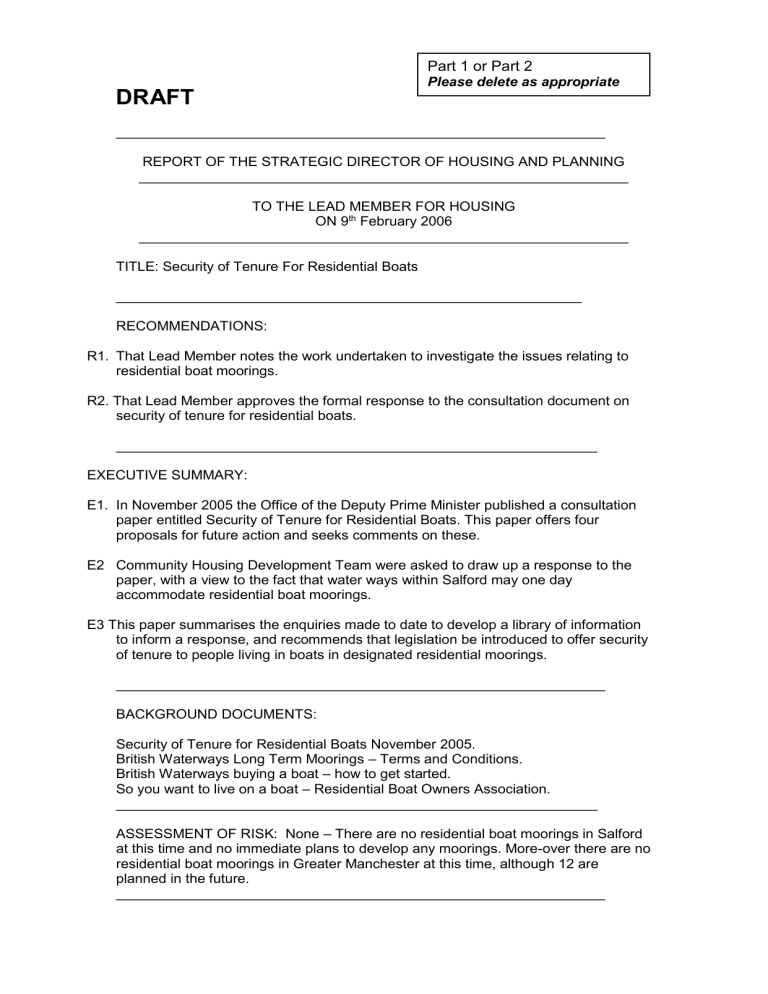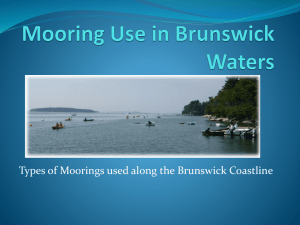DRAFT Part 1 or Part 2

Part 1 or Part 2
Please delete as appropriate
DRAFT
______________________________________________________________
REPORT OF THE STRATEGIC DIRECTOR OF HOUSING AND PLANNING
______________________________________________________________
TO THE LEAD MEMBER FOR HOUSING
ON 9 th February 2006
______________________________________________________________
TITLE: Security of Tenure For Residential Boats
___________________________________________________________
RECOMMENDATIONS:
R1. That Lead Member notes the work undertaken to investigate the issues relating to residential boat moorings.
R2. That Lead Member approves the formal response to the consultation document on security of tenure for residential boats.
_____________________________________________________________
EXECUTIVE SUMMARY:
E1. In November 2005 the Office of the Deputy Prime Minister published a consultation paper entitled Security of Tenure for Residential Boats. This paper offers four proposals for future action and seeks comments on these.
E2 Community Housing Development Team were asked to draw up a response to the paper, with a view to the fact that water ways within Salford may one day accommodate residential boat moorings.
E3 This paper summarises the enquiries made to date to develop a library of information to inform a response, and recommends that legislation be introduced to offer security of tenure to people living in boats in designated residential moorings.
______________________________________________________________
BACKGROUND DOCUMENTS:
Security of Tenure for Residential Boats November 2005.
British Waterways Long Term Moorings – Terms and Conditions.
British Waterways buying a boat – how to get started.
So you want to live on a boat – Residential Boat Owners Association.
_____________________________________________________________
ASSESSMENT OF RISK: None – There are no residential boat moorings in Salford at this time and no immediate plans to develop any moorings. More-over there are no residential boat moorings in Greater Manchester at this time, although 12 are planned in the future.
______________________________________________________________
SOURCE OF FUNDING:
None required
_____________________________________________________________
LEGAL IMPLICATIONS: - None
______________________________________________________________
COMMUNICATION IMPLICATIONS: The formal feedback response to the consultation document needs to be communicated to the ODPM.
PROPERTY: not applicable
______________________________________________________________
HUMAN RESOURCES: Not applicable.
______________________________________________________________
CONTACT OFFICER: Glyn Meacher Senior Manager Community Housing
Development Team Tel 8752
______________________________________________________________
WARD(S) TO WHICH REPORT RELATE(S): none
______________________________________________________________
KEY COUNCIL POLICIES: City of Salford Housing Strategy
The Councils 7 Pledges
______________________________________________________________
DETAILS:
1. Purpose of the Report
1.1 The purpose of this report is to demonstrate how information has been gathered about residential and long-term boat moorings in order to inform the consultation response.
1.2 This information has been used to provide a summary of the issues, and make a recommendation that people living in residential boats be offered security of tenure.
2. Introduction
2.1 The objective of the consultation paper is to consider whether there is a need for occupants of residential boats at long term moorings to be given security of tenure and additional contract rights, and if so, to determine the appropriate level.
2.2 The paper examines how residential moorings are managed particularly with regard to security of tenure. Some of the problems that exist with these arrangements are highlighted and some possible solutions outlined.
3. Background
3.1 During the development of the Housing Act 2004 a number of representations were made to the Government about the absence of protection for those living on boats, that was provided by the Bill to owners of park homes. The Government agreed to explore the possible options and develop a consultation paper in 2005.
3.2 Government statistics are not currently available on the number of people who live on boats, however, there is an estimated 10,000-15,000 boats that are the primary residence for their occupiers according to the Association of
Inland Navigation Authorities (AINA).
3.3 However, the AINA suggests that there are fewer than 2000 officially
recognised residential moorings on inland waterways or marinas, in the U.K.
3.4 The U.K’s inland waterways are managed by 30 navigation authorities, each
with its own legislation governing the operation of its waterways.
4. Work conducted to date to investigate the issues
4.1 In order to gather information on this issue a number of enquiries were conducted:
4.1.1 The Manchester Ship Canal Company
The Manchester Ship Canal Company confirmed that they have no residential boat moorings on the Bridge Water Canal at this time. 6 moorings are planned for Preston Brook Marina in the future.
However, no residential moorings are planned in Salford.
4.1.1.1 British Waterways
British Waterways confirmed that there are no official residential moorings in the North West. All current moorings are designated for long term leisure purposes only, where alternative postal addresses are required.
4.1.1.2 They are however, aware that some people do unofficially live on their boat. British Waterways response to this is that as long as they are not causing the council a problem, and are not a nuisance to other boaters or local residents, then they will leave them alone.
4.1.1.3 In 2007, 6 residential boat moorings are planned for the Piccadilly area of Manchester. The nearest residential boat moorings, to Salford, at this time are reported to be South of Birmingham.
4.1.1.4 British Waterways use annual renewable permits for residential boat moorings. These give authority for someone to moor a boat at a
particular site, but not mooring a particular berth. The boat must be properly licensed.
4.1.1.5 Reasonable access with reasonable notice to the mooring and to move the boat to another mooring is a general condition of the agreement. Conditions on behaviour at the site/mooring are also established.
4.2.1 Residential Boat Owners Association (RBOA)
Information available from the Residential Boat Owners Association notes that residential moorings are in short supply and if available can be very expensive. They also note that the performance of landlords can be diverse. The RBOA in tandem with the London Rivers
Association, drew up some practical guidelines for those involved in planning, setting up and running a residential mooring. In addition,
“Making Mooring Agreements Work” contains specimen mooring agreement clauses. Efforts have been made to discuss these issues further with the RBOA.
5. Problems identified, through representations made to the Government
5.1 Residential boat occupants reported the following types of problems associated with mooring agreements:
use of unfair terms
illegal eviction
unilaterally changing agreements
substantial / unsupported increases in charges
lack of right of challenge
lack of resale potential of mooring agreements
discrimination against owners who raise concerns about moorings
5.2 Additionally, operators concerns were noted to be:
Health and safety issues
Standards/upkeep of boats
Effect on local community and environment
Harassment and illegal eviction
6. Options for consideration
The options outlined in the consultation paper.
6.1 Option 1 – No action
The paper suggest that whilst problems have been highlighted these are mainly contractual issues and market forces could be allowed to look after these private contractual relationships which are between the individual and a private firm. In addition there is a range of consumer protection legislation which could be enforced.
6.2 Option 2 – Introduce best practice guidance for moorings.
This will provide further information to residents on what they should be expecting from their tenure agreement. It would also outline rights and responsibilities of both parties.
6.3 Option 3 – Introduce a model agreement.
This allows the ODPM to outline fair and equal agreement between the two parties, acknowledging rights and responsibilities of both parties.
6.4 Option 4 – Introduce legislation on implying terms into all agreements.
This could take many forms and give additional rights but would most likely involve automatically implying terms into the agreements between occupants of residential boats and the mooring providers.
7. Feedback on options
Option 1
7.1 Residential boat moorings are one of the few types of permanent residence not covered by security of tenure legislation. More-over, to continue with the status quo would mean that complaints about contracts and especially rent reviews are likely to continue.
Option 2
7.2 Sharing of best practice could help to save money and it is identified that this
may help to sustain the waterways agenda. This would also empower residents. This would not however be enforceable. This option would still mean that boat moorings would continue to be one of the few types of permanent residence not covered by legislation.
Option 3
7.3 The introduction of a model agreement for all mooring agents may have economic benefits in terms of legal fees for new agreements. However, there may be some implementation cost to mooring agents. It is again identified that this may contribute to the sustainable waterways agenda. Security of tenure means that tenants are more likely to get more involved in the local environment, and contract terms could minimise the environmental impact.
This would benefit residents as it would highlight their rights and responsibilities. However, this would remain one of the few tenure types not covered by legislation. This model would also not be enforceable.
Option 4
7.3.1 The introduction of legislation on implying terms into all agreements would enable more standard contracts to be developed, this is likely to save money in the long term for mooring agents as it is likely that legal fees per new agreement would be reduced. However, in the short term it is recognised that there may be a cost of implementation. This system would contribute to the sustainable waterways agenda and residents are more likely to get involved in the local community. This would also highlight people’s responsibilities.
This method is the only method of enforcing rights to tenure.
8. Recommendations on the proposals set out in the consultation paper
8.1 Despite the small numbers of residential moorings in existence, it is recognised that there are not insignificant numbers of people who’s sole/main place of residence is their boat. It is also recognised that increasingly the
U.K’s waterways are being developed and restored in order to promote the environment and contribute to the sustainable communities that are being promoted around these areas, such as previously busy dock areas that have gradually declined.
8.2 As waterways are improved it is possible that an increasing number of residential moorings will also be developed. As such there is a need to be able to regulate this properly thereby ensuring that landlords and residents are clear about their obligations, rights and responsibilities.
8.3 It is evident that residential boat moorings are the only tenure not covered by legislation, and it seems that the only method of ensuring peoples rights are maintained is by the implementation of such legislation. There needs to be consistency and equity in the responsibilities of both resident and landlord, with particular reference to maintenance of the local environment.
8.4 The development of guidelines for best practice and a model agreement, whilst without doubt a step forward, do not provide any requirement for these to be implemented. Those who choose to live on boats, at properly designated residential boat moorings, should receive the same entitlements to security of tenure as those living on land. The absence of legislation could leave residents subject to inconsistencies between landlords, resulting in an unfair or discriminatory system.
8.5 Salford City Council Community Housing Services therefore would support the implementation of legislation to secure the tenure of residential boats, and recommend that a letter detailing our support for Option 4 be submitted to
ODPM by the closing deadline of February.



